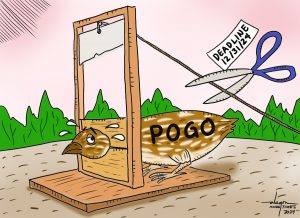By Herman M. Lagon
JO KOY’s performance at the 81st Golden Globe Awards, while polarizing, is a contemporary chapter in the long narrative of comedy’s evolution, a narrative written by the likes of Oscar Wilde’s razor-sharp wit, George Orwell’s incisive social critiques, and Mark Twain’s timeless humor. These icons, along with contemporary jesters like Trevor Noah, Stephen Colbert, Steve Carell, Jon Stewart, Ricky Gervais, David Letterman, Jay Leno, and Sacha Baron Cohen, have all used humor to mirror society, illuminating truths often uncomfortable but necessary. Their legacy reminds us that comedy has always danced on the edge of societal norms, much like the ancient Greek and Roman satirists who used humor to question the status quo.
However, the backlash against Jo Koy, mainly from figures like the “pre-offended looking” Taylor Swift, suggests a troubling shift. It is as if Swift, who usually sings about heartbreak, decided to break up with humor altogether. This reaction reflects a more significant trend reminiscent of the Pura Luka Vega incident, where artistic expression grapples with societal norms and expectations. Like Jo Koy’s comedic act, Vega’s provocative performance highlights the delicate tightrope-balance comedians must navigate in a world where humor can be both a unifier and a divider.
Criticizing Jo Koy for his heritage rather than comedic merit is akin to telling Jonathan Swift his satire was too “swift” or chastising Voltaire for being too voltaic. It overlooks the essence of satire—a tradition championed in different times, shapes, and forms locally by the late Willie Nepomuceno, Tado Jimenez, Manuel “Mr. Shooli” Urbano, and Graciano Lopez Jaena, and continued by Jon Santos, Red Ollero, Apolonio “Pugad Baboy” Medina, Jervi Ryan “Kalad Karen” Lisaba, and Mae “Juana Change” Paner. These humorists understood that comedy, at its core, is a social commentary, often served with a side of discomfort.
In defending Jo Koy, just like what most of his fellow stars like four-time Oscar winner Whoopi Goldberg, seasoned broadcaster Howard Stern, five-time Grammy awardee comic Steve Martin, stand-up funnyman Kevin Hart, Filipino singer-comedian Michael V, and award-winning actor John “General Luna” Arcilla did in his defense, we are not just protecting a comedian’s right to a bad joke but upholding a time-honored tradition of satire and free speech. This tradition, dating back to the satirical plays of Aristophanes and the biting humor of Juvenal, has long been society’s way of holding a mirror up to itself, albeit sometimes a distorted, fun-house mirror.
For her part, Jo Koy’s mother, Josie Harrison, expressed her disappointment over her son’s Golden Globe hosting criticism, especially from Filipinos (hinting at crab mentality), and advised him not to dwell on negativity, highlighting the challenges of being a comedian in a diverse audience. She commended his efforts to represent the Asian community and the support he received from celebrities. She might have wanted to say further that being a comedian is challenging, and it is impossible to please everyone, especially when addressing a diverse audience; when one decides to attend the Golden Globe, one consents to be butchered in the front-row seat.
Politicians, civil servants, showbiz personalies, online influencers, community leaders, and people like Duterte, Marcos, Romualdez, Quiboloy, Trump, and (Taylor) Swift must cultivate tolerance towards the jabs of political and showbiz satirists, commentators, and columnists. The role of a public figure, even of a celebrity or multimedia personality, inherently invites scrutiny and, occasionally, satire, which acts as a barometer of public sentiment and a form of accountability. Their willingness to embrace, or at least tolerate, such comedic critiques speaks volumes about the health of our democracy. It is a form of resilience and openness that acknowledges freedom of expression and understands the value of humor as a societal lens. The ability to laugh at oneself, particularly when in positions of authority, power, wealth, and popularity, is indicative of both strength and humility. These qualities are indispensable for effective and compassionate leadership as well as for entertaining others.
Jo Koy’s case is a microcosm of the ongoing debate over the role of lampoon, caricature, parody, spoof, satirical humor, and social commentary in society. It is a reminder that comedy, in its most potent form, is meant to challenge us, make us think, enliven our senses, and sometimes make us uncomfortable. In defending the likes of Jo Koy, we defend the legacies of those who understood the power of a well-timed joke or a satirical jab—to enlighten, to entertain, and most importantly, to provoke thought.
So, as we critique Jo Koy’s performance, let us remember that comedy has always been a tightrope between hilarity and offense. It is about finding that sweet spot where laughter meets introspection. Hence, let us pray that the comic commentary continues enlightening, entertaining, engaging, and, most importantly, challenging us. After all, if history has taught us anything, it is that a world without the provocations of satire is no laughing matter.
***
Doc H fondly describes himself as a ‘student of and for life’ who, like many others, aspires to a life-giving and why-driven world that is grounded in social justice and the pursuit of happiness. His views herewith do not necessarily reflect those of the institutions he is employed or connected with.


